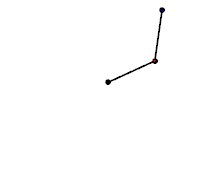There is no data from the future: Difference between revisions
Amwelladmin (talk | contribs) No edit summary |
Amwelladmin (talk | contribs) No edit summary Tags: Mobile edit Mobile web edit Advanced mobile edit |
||
| (3 intermediate revisions by the same user not shown) | |||
| Line 1: | Line 1: | ||
{{a|devil| | {{a|devil| | ||
{{ | {{Wmc|Trajektorie eines Doppelpendels.gif|Something simple but utterly unpredictable, yesterday. It is quite entrancing, isn’t it? Even though it is just a gif.}} | ||
}} | }}{{Drop|S|omething that should}} be so utterly obvious it need not be said, but which nevertheless forms the backbone of the [[Past results are no guarantee of future performance|most common disclaimer on the planet]]. That we know only what we know, and do not know what happens next, is a lesson that ''should'' have been beaten into us, with fables such as the scientific turkey who, reasoning by [[induction]] alone, looks forward the farmer’s visit at breakfast each morning and gets quite the surprise come Christmas; the [[jointed pendulum]] whose trajectory, despite being a heavily constrained simple system, is quite impossible predict beyond about two swings; and the disastrous history of the financial markets. | ||
But yet we persist in believing the past is a conditioning guide to the future. The cult of [[big data]] is, on this view, a [[reductionism|reductionist]] autistic fantasy cherished by those who labour under the illusion — ''delusion'', really — that, rather than just looking up and paying attention, we are better to manage the onrushing future by turning backward and extrapolating it from the past. | |||
Of course, data is excellent for [[post hoc]] [[inferential reasoning]] — explaining ''after'' the fact why something no-one expected to happen ''before'' the fact, ''in'' fact, did — this is the research programme of [[evolution]], in a nutshell — but we should not be {{strike|deluded|seduced}} into projecting that excellent rationalising power into the unknown darkness ahead. [[The past is a different country]]. | |||
{{sa}} | {{sa}} | ||
{{Gb|[[The past is a different country]]<li>[[Past results are no guarantee of future performance]] | |||
<Li>The [[Quickening]]<li>[[Backtesting]]<li>[[Profound ontological uncertainty]]}} | |||
Latest revision as of 08:37, 26 September 2024
|
|
Something that should be so utterly obvious it need not be said, but which nevertheless forms the backbone of the most common disclaimer on the planet. That we know only what we know, and do not know what happens next, is a lesson that should have been beaten into us, with fables such as the scientific turkey who, reasoning by induction alone, looks forward the farmer’s visit at breakfast each morning and gets quite the surprise come Christmas; the jointed pendulum whose trajectory, despite being a heavily constrained simple system, is quite impossible predict beyond about two swings; and the disastrous history of the financial markets.
But yet we persist in believing the past is a conditioning guide to the future. The cult of big data is, on this view, a reductionist autistic fantasy cherished by those who labour under the illusion — delusion, really — that, rather than just looking up and paying attention, we are better to manage the onrushing future by turning backward and extrapolating it from the past.
Of course, data is excellent for post hoc inferential reasoning — explaining after the fact why something no-one expected to happen before the fact, in fact, did — this is the research programme of evolution, in a nutshell — but we should not be deluded seduced into projecting that excellent rationalising power into the unknown darkness ahead. The past is a different country.
